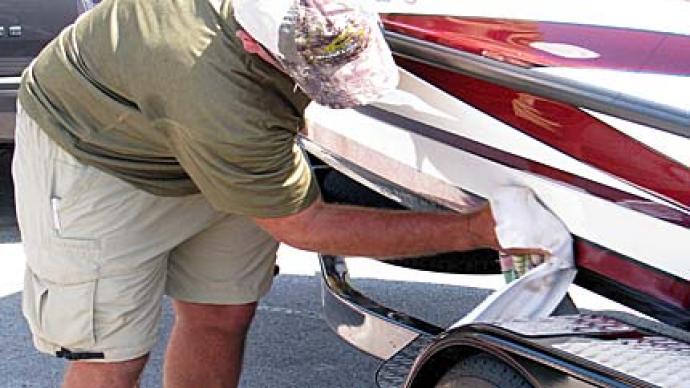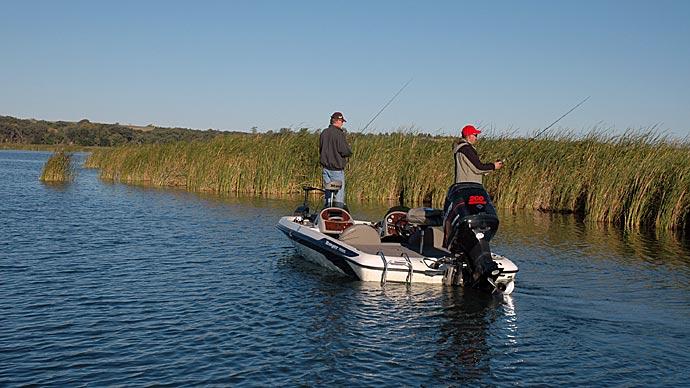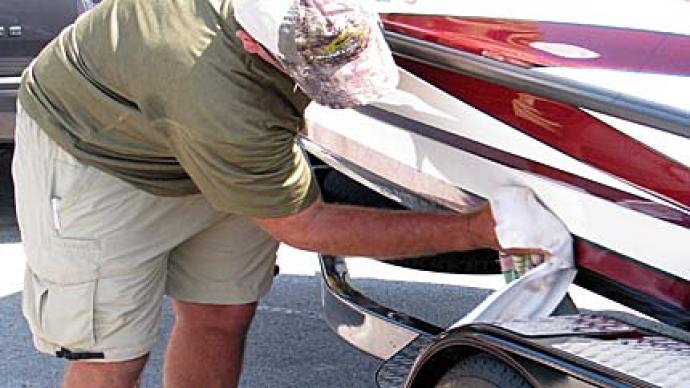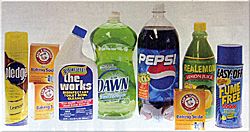
After a hard few days fishing in Michigan's Upper Peninsula, on mineral-filled freshwater lakes that left hull and outboard flecked with water spots and white scale, you'd think it would have taken a chisel to pry the crud loose. But Joe Beech, maker of JNB Originals specialty walleye tackle and all-around handyman, pulled out a spray bottle, spritzed the stains, and wiped clean with a towel. His magic elixir? Toilet bowl cleaner ($1.89 for 32 ounces) diluted with water. In keeping with Beech's resourcefulness, we've assembled a collection of unexpected cleaners and solvents that do the job quickly and inexpensively. Best of all, these boater's little helpers are waiting in the cupboard or under the kitchen sink, ready for serious action beyond their everyday uses.
The Works
With The Works Toilet Bowl Cleaner, elbow grease is minimal when swabbing a water-stained fiberglass hull, the plastic hood of an outboard, or an engine's metal driveshaft housing where heat bakes on white gunk-like cake frosting. After all, the solvent removes the lime scale and hard water buildup. To press into action, dilute The Works in a spray bottle 4-to-1 with water, then squirt on and wipe off. Warning: Be sure you get toilet bowl cleanser, not drain cleaner, which might very well eat a hole in your hull.
Lemon Juice
It's no secret that fish and lemon juice go together. But in this case, citrus doesn't complement fish - it eliminates the smell of it. When your livewell reeks like a cannery in the hot sun, first rinse thoroughly with water and clean of any detritus such as scales. Next, pour half a bottle of lemon juice from concentrate and fill it with fresh water. Run the liquid through the pump on recirculate mode and leave overnight if particularly nasty. Meanwhile, save some of your leftover juice for the cutting board. Scrub with salt and a wet towel, rinse and wipe with lemon. Your cutting board - and your nose - will thank you.
Pledge
Plexiglas windshields commonly get gunked with rain and spray - sometimes so much so that it's hard to see where you're going. Enter Pledge, the lemony-fresh furniture polish that not only lifts smudges from wooden tables but also cleans Plexiglas and helps water bead and run away. To remove the Rorschach-blotolike water stains, spray on them and wipe them with a clean cloth. Now you'll know what you're seeing.
Easy-Off Oven Cleaner
Want to remove or change the painted-on name of your fiberglass boat? Easy-Off Oven Cleaner on a rag will remove it faster than you can say HMS Fearless. When the paint is off, wipe away excess oven cleaner and rinse well. It's time to get creative and come up with a new name. Sorry, "Serendipity" doesn't cut it.
Dawn Dish Soap
Mmmm, bilge water. There's nothing as nasty as the oil and funk dwelling down there. To cut through it, squirt a hefty load of liquid soap made to cut grease in dishwater, and foam it up with a hose. If the boat's on a trailer, drive it around the block to jounce the bubbles. Grease and grime will solidify, and you can remove chunks of oil by hand. Rinse thoroughly, and you're on your way to a cleaner, better bilge.
Pepsi
There's nothing like the real thing about removing the most stubborn corrosive buildup from battery terminals - that thick crust too stubborn even for baking soda. Pour some Pepsi on your problem, and watch the acid in it melt the mess away. (Pepsi also removes rust from, say, a trailer hitch.) Be sure to rinse well with fresh water to avoid any sticky, sugary leftovers. Now, baking soda and water, plus a stiff brush, is the best bet for the finishing touches.
Baking Soda
What's not to love about baking soda, perhaps the best cleaner in the boating universe? For mild corrosion on battery posts, mix one part powder with three parts water and scrape with a brush. Beyond batteries, turn to baking soda for an excellent all-purpose cleaner. Mix 1/2 cup baking soda, 1/2 cup white vinegar, and 1 cup ammonia with 1 gallon of warm water poured into a spray bottle. The potion works on hull stains, not to mention general cleaning. It's ready if you are.
| General Boat Maintenance and Winterizing | ||||||||||||||||||||||||||||||||||||
|
To properly winterize your boat, you'll need more than a few household cleaners. Here are a few things that you (or your boat dealer) should do if you plan to store your boat through the winter:
Image
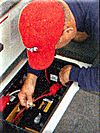
Image

Image
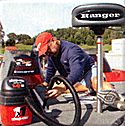
|
Content provided by Bass Fishing Magazine, the official publication of FLW Outdoors


